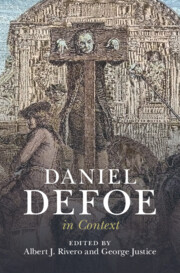Book contents
- Daniel Defoe in Context
- Daniel Defoe in Context
- Copyright page
- Contents
- Illustrations
- Notes on Contributors
- Preface
- Acknowledgements
- Chronology
- Part I Life and Works
- Part II Literary Context
- Part III Authorship and Copyright
- Part IV The Monarchy and Parliament
- Part V Social Structures and Social Life
- Chapter 23 The Penal System
- Chapter 24 Defoe and Religion
- Chapter 25 Social Status and Social Mobility
- Chapter 26 Education and Opportunity
- Chapter 27 Men and Women
- Chapter 28 Defoe and China
- Chapter 29 London, 1660–1731
- Chapter 30 The Environment
- Chapter 31 Marriage Law
- Chapter 32 Daniel Defoe and the Law of the Sea
- Chapter 33 Disability
- Chapter 34 Defoe and Colonialism
- Chapter 35 Defoe and Animals
- Chapter 36 Defoe and Slavery
- Chapter 37 Economics
- Chapter 38 Defoe and the Supernatural
- Chapter 39 Defoe and America
- Part VI Critical Fortunes and Literary Afterlife
- Further Reading
- Index
Chapter 32 - Daniel Defoe and the Law of the Sea
from Part V - Social Structures and Social Life
Published online by Cambridge University Press: 27 April 2023
- Daniel Defoe in Context
- Daniel Defoe in Context
- Copyright page
- Contents
- Illustrations
- Notes on Contributors
- Preface
- Acknowledgements
- Chronology
- Part I Life and Works
- Part II Literary Context
- Part III Authorship and Copyright
- Part IV The Monarchy and Parliament
- Part V Social Structures and Social Life
- Chapter 23 The Penal System
- Chapter 24 Defoe and Religion
- Chapter 25 Social Status and Social Mobility
- Chapter 26 Education and Opportunity
- Chapter 27 Men and Women
- Chapter 28 Defoe and China
- Chapter 29 London, 1660–1731
- Chapter 30 The Environment
- Chapter 31 Marriage Law
- Chapter 32 Daniel Defoe and the Law of the Sea
- Chapter 33 Disability
- Chapter 34 Defoe and Colonialism
- Chapter 35 Defoe and Animals
- Chapter 36 Defoe and Slavery
- Chapter 37 Economics
- Chapter 38 Defoe and the Supernatural
- Chapter 39 Defoe and America
- Part VI Critical Fortunes and Literary Afterlife
- Further Reading
- Index
Summary
This essay ties together some key elements of a maritime existence – indulgence, mercy, pretence, prerogative, plunder, homicide – and contrasts them with the growing importance among commercial societies of contract, justice, rights, the legal alienation of goods, and the punishment of those who take what is not theirs. And then it measures Defoe’s adherence on the one side to what amounts to a state of war, and on the other to a state of civil society. It comes as a surprise to find that Defoe, author of The Compleat English Tradesman, entertains opinions about sovereignty that are far from being commercially orthodox. The moment when the pirate Bob Singleton becomes aware that he can exercise the prerogative either of absolute power, and kill his captives, or of mercy, letting them live and even healing their wounds, marks the end of his feelings of guilt and uselessness, and the access of an ecstatic kind of self-discovery, a sort of sublime caprice.
Keywords
- Type
- Chapter
- Information
- Daniel Defoe in Context , pp. 265 - 275Publisher: Cambridge University PressPrint publication year: 2023

